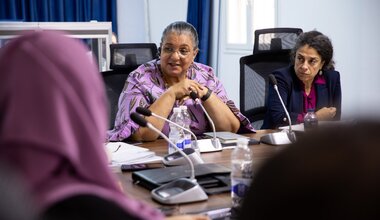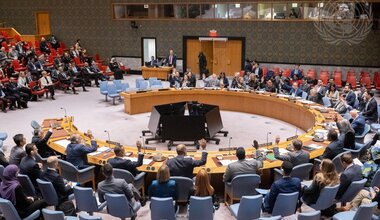UNSMIL in Urgent Consultations with the Parties to Ensure Convening of Dialogue Soon
25 February 2015 – Following recent political and security developments, particularly the terrorist bombings in the City of Al-Qubbah and the decision of the House of Representatives to suspend its participation in the political dialogue, the United Nations Support Mission in Libya (UNSMIL) is undertaking a series of urgent consultations with the parties to ensure the convening of the next round of talks soon.
UNSMIL appeals to all parties not to allow this window of opportunity to slip away. The Mission calls upon them to renew their commitment to a peaceful resolution of the Libyan crisis.
In this regard, UNSMIL would like to clarify a number of misconceptions in recent media coverage regarding the talks:
1. The Libyan Dialogue rounds were conducted in a responsible and serious environment, with a high sense of resolve and determination on the part of the participants to reach a comprehensive political agreement to end the Libyan crisis and restore security and stability.
2. The participants and the United Nations were fully transparent during their work on the dialogue; decisions were made by participants after broad and inclusive deliberations and consultations.
3. The United Nations believes that ending the severe political division in Libya is of critical importance, since its continuation will pose a clear threat to the unity and cohesion of the country. Accordingly, it is urgent and necessary to reach an agreement on a strong and independent government, whose highest priority should be restoring the confidence of the citizens in the Libyan State, as well as provision of services and combatting terrorism, since terrorism has become a real threat to the political process, the Libyan State, and the security and stability of the country and the region.
4. This dialogue is intended to produce proposals, which in turn have to be endorsed by Libyan stakeholders and supported by the people. All decisions made by dialogue participants, whether related to the consensual government's mechanism, method of formulation and tasks, or to security arrangements related to the ceasefire and withdrawal of armed elements from the cities, are first and foremost Libyan decisions that are made by the consensus of the participants, which is an already agreed mechanism, without prescription or imposition from any side.
5. The United Nations, as facilitator of the Libyan-Libyan dialogue sessions, is fully committed to the unity, independence and sovereignty of Libya, and to the impartiality and objectivity of its work. In addition, it is committed to creating a suitable environment for the interlocutors to ensure the success of the dialogue. Special Representative of the Secretary-General Bernardino Leon has reiterated to Libyan leaders the neutrality of the United Nations on many occasions, the last of which when he contacted Interim Prime Minister Abdullah Al-Thinni to offer condolences for the victims of the terrorist bombings in Al-Qubbah. In the telephone conversation, Leon said that a political agreement is the safeguard to Libya's unity and ability to combat terrorism, and asked for the interim government's public support for the dialogue. The Special Representative assured Mr. Al-Thinni that the international community remains fully supportive of the dialogue.
 United Nations Peacekeeping
United Nations Peacekeeping UN
UN









